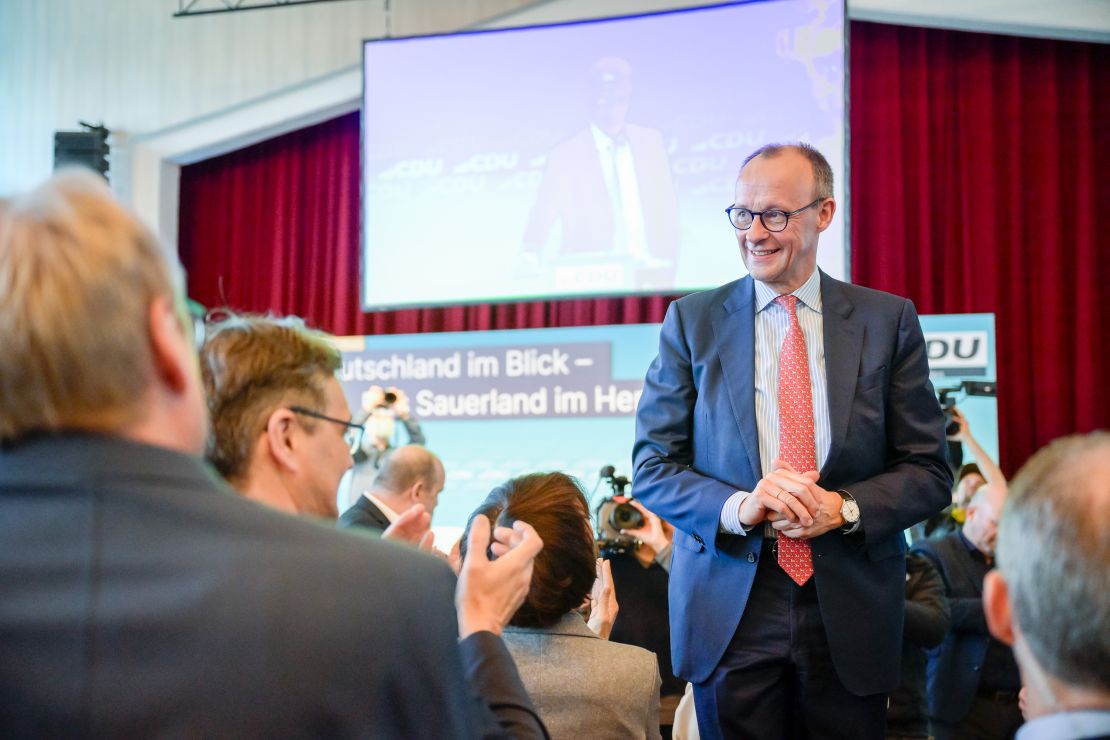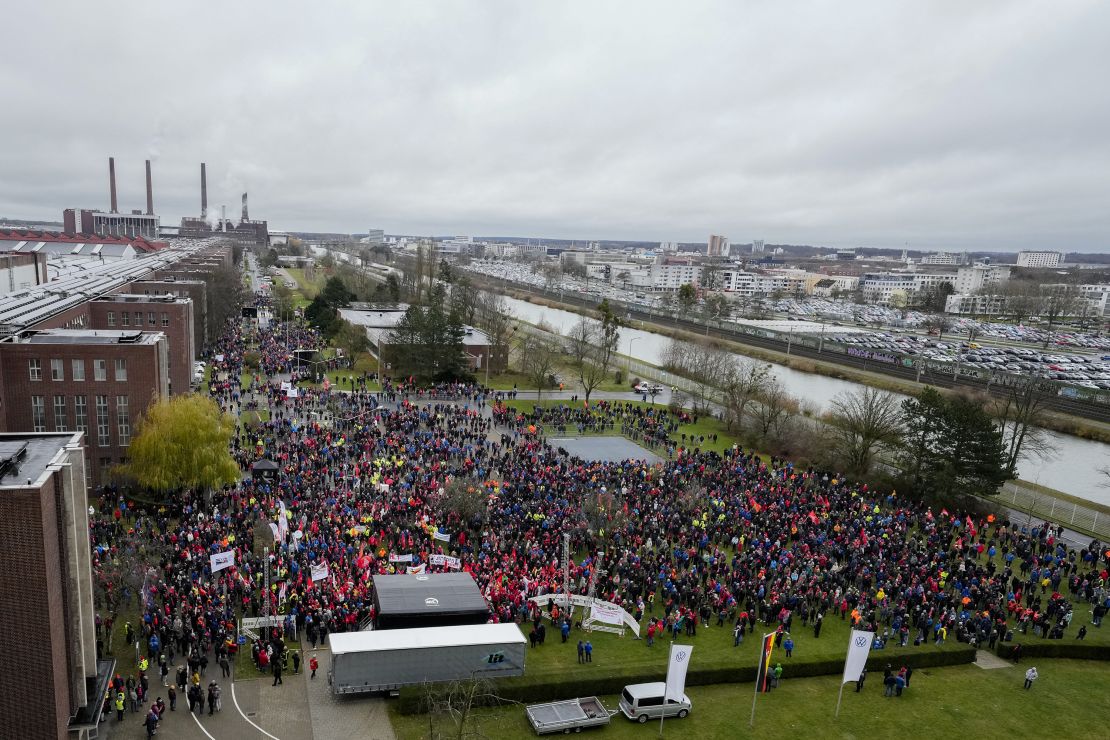CNN
—
Germany, Europe’s largest economy and normally a pillar of stability, faces snap elections next year after Chancellor Olaf Scholz lost a vote of confidence.
His government collapsed in a budget dispute in November, but his coalition has been unstable for months.
Scholz lost the vote, which he described as a step towards securing an early federal election, with 394 votes against, 207 votes in favor and 116 abstentions.
With the election date set for February 23rd next year, here is what is at stake.
There will be seven major parties that Germans will elect. Four of the seven have made official announcements about it Candidates for chancellor – Candidates for Chancellor.
The two ubiquitous dominant parties of German politics, the Christian Democrats (CDU) and the Christian Social Union (CSU), unofficially called the Union, form one grouping. The Social Democrats, or SPD for short, form another.
Due to the German proportional representation system, the government is usually formed in a coalition, usually headed by the CDU/CSU or the SPD.
The winner looks for a partner to form a majority. Since 2021, Scholz’s SPD has governed in an uneasy coalition with the liberal FDP and the Greens. In the 16 years before Scholz’s three-party coalition, the CDU under Angela Merkel had relied on both the SPD and the FDP as partners in various governments.
This time the CDU/CSU is led by Friedrich Merz, the SPD by the incumbent but deeply unpopular Chancellor Scholz.
The far-right party Alternative for Germany (AfD) enjoyed a nationwide boost thanks to strong performances in regional elections. The party’s co-chair, Alice Weidel, is hers Candidate for chancellor. She is known for her hard-hitting speeches and populist policies, particularly on migration. She is an ardent advocate for preserving traditional German values and famously said, “Nobody touches my schnitzel!” – a reference to the popular dish.
The Greens should also be kept in mind. It is unlikely to win enough votes to become the largest party, but could still play an important role in forming the next government. The Greens are led by Robert Habeck, the country’s current economics minister.
The three other major parties will be the Free Democrats; the BSW, a left-wing socialist group named after its leader Sahra Wagenknecht; and finally Die Linke, a left-wing political party. All three have not yet officially announced their candidates.
Unless there is a major and unexpected swing in the polls, it is very likely that Merz of the CDU/CSU will become Germany’s new chancellor.
In nationwide opinion polls, the CDU/CSU is currently well ahead with 32% of those surveyed. The AfD is currently in second place with 18%, the SPD in third with 16% and the Greens with 14%.

Merz is not a newcomer to German politics, but this is his second career as a politician.
Between 1989 and 1994 Merz was a Member of the European Parliament (MEP) for Germany. He then became a member of the Bundestag and represented the CDU there until 2009. He then left politics and worked as a corporate lawyer, where he sat on numerous supervisory boards, including at the investment giant BlackRock.
Merz represents the Hochsauerlandkreis constituency in the Bundestag, the region in which he was born, and currently lives in his hometown of Brilon. He is also widely considered a millionaire and holds a private pilot’s license.
Merz made two failed attempts to become CDU leader in 2018 and 2020. In 2021 he returned as a member of the Bundestag for the first time in twelve years and subsequently secured the nomination as CDU leader, which he officially took over in September 2022.
He is known for moving the CDU to the right, with a tougher stance on the migration issue and strong economic policy thinking. In his bid to become party leader, he campaigned not to be a Merkel-style heir unlike his challengers, marking the end of the CDU’s centrist policies during her era as chancellor.
Leonie von Randow, a political reporter at German broadcaster WELT TV who will cover the election campaign, told CNN that Merz “knows a thing or two about the economy, and that’s obviously something that’s important to a lot of people.” A lot of people hope he can move things forward.”
Merz is a very strong supporter of supporting Ukraine in the fight against Russia’s full-scale invasion. He has been a vocal supporter of supplying Ukraine with German-made Taurus missiles, weapons that could strike Russian targets far outside the Ukrainian front. Scholz, on the other hand, consistently refused to deliver them to Kyiv.
Merz made a surprise trip to the Ukrainian capital earlier this month, where he called on European nations to develop a “common vision” for peace in Ukraine, particularly given the impending arrival of US President-elect Donald Trump at the White House.
What are the main problems?
The economy will play a central role in the election, especially given the sluggish development under Scholz.
In recent days, the German Central Bank has revised down its forecast growth forecast by 0.2% and stated that “the German economy will stagnate in the winter half of 2024/25 and will only slowly recover over the course of 2025.”
In the context of the economic debate, a focus will be on revitalizing the country’s important automotive industry. The central bank said the problems within the industry were “structural in nature” and were therefore exacerbating the strain on the economy.
Major companies, including Volkswagen, one of the world’s largest automakers, are facing massive layoffs and factory closures.

Disputes over immigration will also be crucial in this election, particularly as parties seek to lure votes from the emerging AfD, which has made it a key issue.
“The election probably comes at a very good time for the AfD… This is a moment when a lot of people are very dissatisfied with the government in general, so they want to somehow make a statement and vote for an extreme party to show “How dissatisfied they are,” von Randow told CNN.
Scholz reintroduced controls at borders with neighboring European countries in recent months, a move that many saw as an attempt to ingratiate himself with voters who may be turning to the populist AfD.
The collapse of the Assad regime in Syria will also play a role in the national debate. Germany took in more Syrian migrants during the civil war than any other European country. Campaigns about how each party would deal with immigrants have already begun.
It is very difficult to imagine a result in which the CDU/CSU and Friedrich Merz do not emerge as winners.
Their lead appears to be solid and unassailable, but the big question revolves around the formation of a stable government. It is unlikely that the CDU/CSU will win an absolute majority of the 630 seats up for grabs. This means that they must form a coalition with one (or more) of the other parties. The question is who?
If the AfD performs as the opinion polls suggest, it would be a major upheaval in German politics. Since its founding in 2013, the party has never won more than 94 seats. In 2021 it was the fifth largest party and in 2017 it was the third largest party.
While the AfD sees itself as a potential kingmaker, the CDU/CSU may not be willing to give it such a prominent voice in running the country.
That leaves the SPD, with whom it has already worked, especially during the Merkel era. Or they could look further left towards the Greens, but that could also involve a conflict between principles and policies due to their more left-leaning nature.
Be that as it may, the federal election is likely to deeply humiliate the SPD and Scholz and enter a phase of self-reflection. “It’s probably the end of his political career,” von Randow told CNN.
CNN’s Benjamin Brown contributed to this report.



